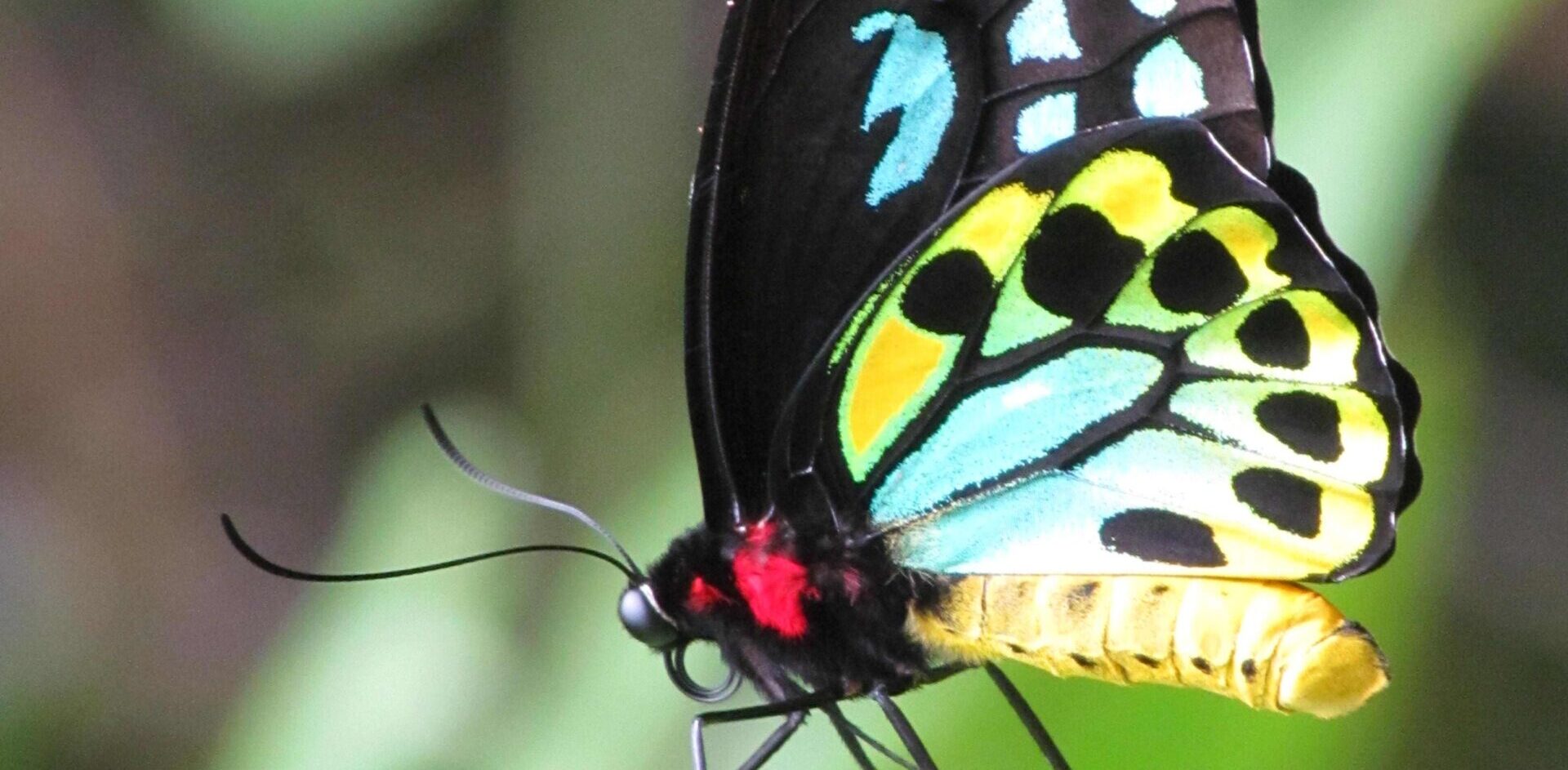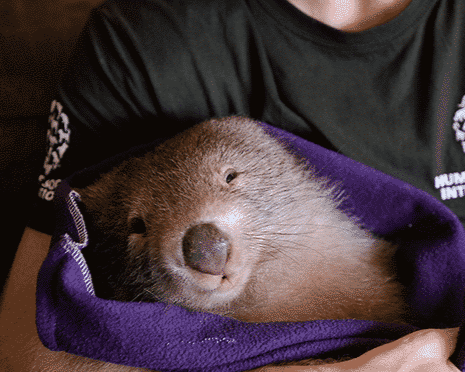The Newsletter of Humane World for Animals' Wildlife Land Trust • Issue 30 • 2025 Read More
by Shane Williams – Bridgetown Wildlife Rescue
The Bridgetown fires in Western Australia burned thousands of hectares in 2022. Though some animals were large enough to outrun the fires, this wasn’t the case with Poppy the brushtail possum, and her baby Penny. Possums retreat to the trees and climb very high up, because their little legs are too short to outrun a fast-moving fire. Trees burn and branches fall, I presume this is what happened to Poppy.
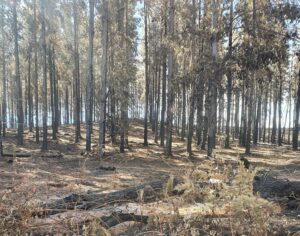
The fire zone that Poppy had endured, and fought so hard to save her baby Penny. The white on the ground is smouldering ash
I received a call from the Bridgetown Fire and Incident Control Centre, asking if I could come and collect what they thought might be a possum found lying in the middle of the road. I was escorted to the office, where on the table lay a damp towel. When I opened the towel, I gasped, then I cried. I will never, ever get that image out of my mind, for as long as I live. There, looking up at me were the most pitiful, beautiful brown eyes I had ever seen, so helpless and hurt. Amongst black charcoal fur, that should have been soft and brown.
As I removed the towel further, there, burnt and singed was her baby possum, still clinging to her mother’s back. I knew I had to collect myself together and get these two little souls home to Bridgetown Wildlife Rescue, not knowing whether I could save them. As I drove home I just cried, the sight of all the bushland burnt to a cinder hit home – how could anything survive the ferocity of that fire? How on earth did this mother possum I named Poppy and baby Penny survive? This made me incredibly determined to save them both: if they survived the fire, I was not going to lose either one of them now!
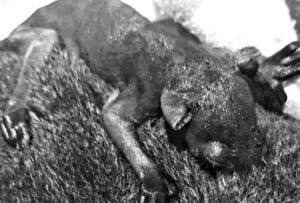
Day one: Penny on top of Poppy’s back. She had survived because her mother carried her through the burning coals.
When I finally arrived home at Bridgetown Wildlife Rescue, I hurriedly took them both to my medical room for treatment. Poppy’s fur was burnt, every inch of it. Her four paws were burnt. I then looked at Penny. The poor little baby was clinging so tightly to Poppy’s back, that it took about five minutes to pry her little paws from her mother’s fur. Poppy just laid so still as I promised her through the tears rolling down my face that I would save her and her baby.
Finally, I had little Penny free from her grip, then I began to inspect her injuries. Penny had singed fur, but being a young baby, she didn’t have a lot of fur. Her eyes were red, dry and sore from the heat and fire, however she was relatively unscathed.
Poppy had told Penny to climb from her pouch and cling to her back as tight as she could, and never let go, and that was what Penny did. Poppy saved her baby’s life: if she had been in her pouch, she would have been burnt from being so close to the ground. Poppy bravely carried her baby through the fire, burning her feet with every step she took, until she reached a place that wasn’t hot and burning … the road, where she was found.
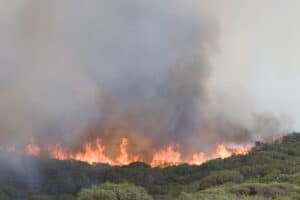
Wildfires like this one move quickly, and for many smaller animals there’s no escape
After the initial treatment of pain relief, fluids and antibiotic cream had been administered to both possums, I then began the laborious job of cutting all the burnt fur from Poppy’s body. Once that was done, I could see what once again resembled a possum. Poppy laid on her side for many hours without moving, even whilst I performed lifesaving medical treatment. She was exhausted. I placed her in my medical basket where she was comfortable, medicated and hydrated. Meanwhile, little Penny had been treated with a warm wash of Betadine to her tiny paws and bathed to remove the charcoal dust around her face and paws. Her eyes were flushed with cool water and ointment applied. She was placed in a hanging pouch in the incubator, so she could sleep and recover.
I fed baby Penny every three hours around the clock for four weeks, until Poppy was well enough to have Penny back by her side. Penny recovered quickly, despite being just 150 grams. She enjoyed lapping her milk from a saucer, and eating her banana and mango, clumsily dropping them from time to time because her paws were still quite sore.
Penny got to spend an hour with her mother each day, which was the highlight of their day. I did this to lift both of their spirits, mainly for Poppy to know that her baby was going well. When it was time for Penny to have a sleep, she would go back to her knitted possum palace.
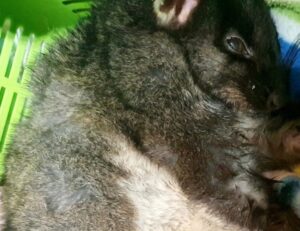
Poppy five weeks later: her fur had grown back but she was still too sore to stand up.
It was a different story with her mother Poppy. She took many weeks to recover and she could not stand on her bandaged paws, because the weight of her body made it too painful. Every three hours around the clock, I would turn Poppy over so she didn’t develop pneumonia, a secondary infection caused by being sick and unable to move. Poppy had all four paws bandaged and treated with antibiotic cream daily, so she couldn’t hold anything to eat. I would place her on my lap and feed her by spoon with a mixture of mashed banana, honey and mango. I would then sit her up and hold a bowl of warm marsupial milk with honey for Poppy to lap, something she really enjoyed.
Poppy slowly started to grow stronger, she had lost a lot of weight but she was strong. It took four weeks for her fur to grow back, and even longer for her burns to fully heal. Throughout the whole recovery period, she never attempted to bite me or protest all the medical procedures that had to be done daily. She was such a beautiful possum to have in care.
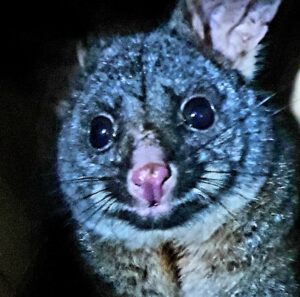 Eight weeks in care: Poppy in her possum box in her aviary, fur all grown back, paws completely healed.
Eight weeks in care: Poppy in her possum box in her aviary, fur all grown back, paws completely healed.
Poppy and Penny are both together now, enjoying their time in their possum box I have for them in the aviary. They both have branches to run along, and Penny is now a very accomplished climber. They will both be released back to the wild, on a lovely private property where there is abundant food and an abandoned orchard full of fruit trees. Above all, they will be safe to live a life together.
There will be many tears of joy shed when I release Poppy and Penny. I will always think of them, and I will never forget the beautiful brown eyes that I made a promise too, many months ago, that I would not let herself and her baby die. I kept my promise.
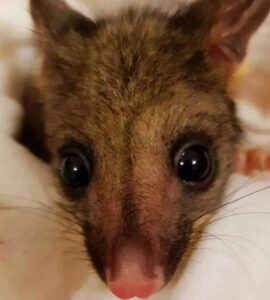 Little Penny’s beautiful face. Her eyes now healthy, and weighing 300 grams.
Little Penny’s beautiful face. Her eyes now healthy, and weighing 300 grams.
Above all, none of this would have happened without the help from Humane Society International who provided the funding for the expensive lifesaving medications that were needed for Poppy and Penny’s survival. Thank you for all that you do, to save our helpless wildlife. Thank you for helping me, so that I could save them.

